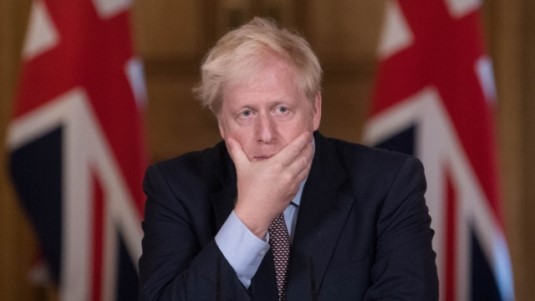
Johnson's ludicrous line, that the advertised bring-your-own-booze party was a normal working day outside in the sun will only wash with those who want to believe. But ultimately, just two things can bring him down. A sense of shame that is yet to manifest in his 57 years of existence, or Tory MPs. Here, matters are apparently febrile as divisions are propagating faster than new allegations of Downing Street partying. Scottish Tory leader Douglas Ross - installed as Johnson's man north of the border - has called on him to resign. Ruth Davidson, without any surprises has joined in, as has over half of the Tories' 31 MSPs. They're not stupid - any opportunity to put distance between the Scottish and the Westminster parties. Amusingly Jacob Rees-Mogg snapped back at Ross, branding him a "lightweight". Wounding.
Also joining the fray is the long-out-of-sorts Caroline Nokes, the 1922's vice chair William Wragg, well-oiled Johnson critic Sir Roger Gale, who sent his no confidence in the wake of the Barnard Castle escapade, and Sayeeda Warsi. Not exactly a critical mass that would make the Prime Minister sweaty. Indeed, Johnson's pressing of the flesh in the Commons tearoom - reportedly a frequent occurrence in times of strife - his non-apology, and the inquiry that's bought him some time seems to be enough to buy the backbenchers off for the moment. We'll see if a weekend with their Associations helps focus critical minds.
Looking from the outside, it looks straightforward, as is what needs to be done for the Tory party's continued health. Partygate is the culmination of everything we've known about Johnson, his carelessness and, indeed, his no-shits-given for the people who put him into Number 10. His authority with the wider electorate has completely shattered, and few are the leaders who've had the skills and patience to piece it back together again - qualities Johnson most definitely lacks. The longer he stays in office the more his ballast will sink the Tories, and the greater the difficulties they'll have refloating the boat. Which begs the question: why are Tory MPs so nervous about moving against him?
Writing for the FT, Robert Shrimsley lists a number of reasons. They fret about who might be the next leader - who would get promoted or left languishing by the ostentatiously loyal Liz Truss and the mysteriously missing Rishi Sunak? Others are holding out for events to reverse Johnson's fortunes. Some might be a touch more Machiavellian, hoping he'll take the hit for everything coming down the line and a new leader, and a reinvented party, will emerge phoenix-like from the ashes if Johnson is disposed of later in the year. Cathy Newman tells a slightly different story, of leadership campaigns on the launchpad and multiplying plots. And if the MPs haven't got the guts, the Tory money men (and they are nearly always men) will make their displeasure clear and parliamentary hands will be forced.
All these things are true but contrary to the Tory party's ruthless reputation, it is instinctively aware and circumspect about context. Thinking of the last two Tory leaders who were ejected by their party, Theresa May and Iain Duncan Smith, both times were owing to failures on their own part and it was games at Westminster that finished them. Compare to Margaret Thatcher. The Poll Tax destroyed her political position but Europe was the pretext the Tories used to get rid of their most successful leader. In other words, mass opposition could not be seen to be the root of her defenestration, otherwise people (if not the people) might start getting ideas. Chucking Johnson out while under popular pressure runs a similar risk. If outraging public decency is a career-ending matter, then future Tory administrations have less room for manoeuvre. A real problem when serial wrongdoers like Dominic Raab, Priti Patel, and Rees-Mogg are in the frame for future top jobs regardless of who succeeds Johnson. In other words, the Tories are alive to any manifestation of collective power, no matter how diffuse and vague it is, because out of them political confidences can grow. If Johnson is forced out, it will be after this present moment of danger has passed.
Image Credit
2 comments:
I'm interested in why, suddenly, MrJ is no longer teflon man, but all this mud is sticking. Who wants to get rid of him (apart from many of the public) and why now?
I hope Johnson survives and continues as a lame duck doing maximum damage to the Tories. I expect they'll get rid of him though if it appears he's a liability. They're totally ruthless the Tories - they even threw out Mrs Thatcher when she'd reached her sell by date despite all her achievements.
Post a Comment